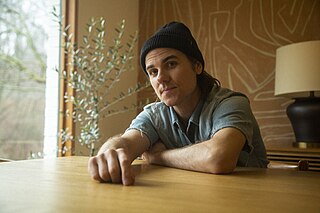Music
- My Religion (album), an album by Norwegian band TNT
- "My Religion", a 2018 song by Dierks Bentley from the album The Mountain (Dierks Bentley album)
- "My Religion", a 2004 song by Ryan Starr
- "Mi Religión" ("My Religion"), a single by Yandel
My Religion may refer to:

Frederick Dierks Bentley is an American country music singer and songwriter. In 2003, he signed to Capitol Nashville and released his eponymous debut album. Both it and its follow-up, 2005's Modern Day Drifter, are certified Platinum in the United States, and his third album, 2006's Long Trip Alone, is certified Gold. It was followed in mid-2008 by a greatest hits package. His fourth album, Feel That Fire, was released in February 2009, and a bluegrass album, Up on the Ridge, was released on June 8, 2010. His sixth album, Home, followed in February 2012, as did a seventh one, Riser, in 2014. Bentley's eighth album, titled Black, was released in May 2016, and his ninth, The Mountain, was released in June 2018. His tenth studio album, Gravel & Gold, was released in February 2023.
The Warren Brothers are an American country music duo composed of brothers Brett Warren and Brad Warren. The duo has released three studio albums: Beautiful Day in the Cold Cruel World (1998) and King of Nothing (2000) on BNA Records, as well as Well Deserved Obscurity (2004) on Sig/429 and a 2005 compilation album, Barely Famous Hits. These four albums have produced nine charting singles on the Billboard Hot Country Songs charts, with the highest being "Move On" at No. 17 in late 2000-early 2001. Brad and Brett have also co-written songs for Taylor Swift, Dierks Bentley, Faith Hill, Tim McGraw, and Martina McBride.

Dierks Bentley is the debut studio album by American country music artist of the same name. It was released on August 19, 2003 by Capitol Records Nashville. It produced three singles with "What Was I Thinkin'", "My Last Name", and "How Am I Doin'". The first one became Bentley's first number one hit on the US Billboard Hot Country Songs chart. The album sold 1.1 million copies in the US.

Ross Copperman is an American Grammy-nominated singer-songwriter and record producer. After his experience as an artist in the UK, Copperman went to Nashville, Tennessee, where he pursued a career in country music. He has written 41 No. 1 songs including Billy Currington's "Don't It," Luke Bryan's "Strip It Down," Keith Urban's "John Cougar, John Deere, John 3:16" and Kenny Chesney’s “Get Along.” Copperman has also produced for artists including Brett Eldredge, Dierks Bentley, Eli Young Band, Darius Rucker, Jake Owen, Kelsea Ballerini, Kenny Chesney, Chayce Beckham, Warren Zeiders and Gabby Barrett.

Jon Randall Stewart is an American producer, songwriter, and musician.

American country music singer and songwriter Dierks Bentley has released ten studio albums, one live album, one compilation album, and 33 singles. In 2003, Capitol Nashville released Bentley's self-titled debut album. The album's first single, "What Was I Thinkin'", reached number 1 on the US Billboard Hot Country Songs chart, and 22 on the Billboard Hot 100, his highest-charting single there to date. Bentley then released two studio albums in 2005 and 2006 and produced several number 1 hits on Billboard Hot Country Songs. In 2007, Bentley released a live concert DVD, Live and Loud at the Fillmore, which was recorded in Denver, Colorado.
Band of Brothers may refer to:

"I Wanna Make You Close Your Eyes" is a song co-written and recorded by American country music artist Dierks Bentley. It was released in July 2009 as the third and final single from his 2009 album Feel That Fire. Bentley wrote the song with Brett Beavers.
In My Head may refer to:

Up on the Ridge is the fifth studio album by American country music artist Dierks Bentley. It was released on June 8, 2010 by Capitol Records Nashville. The album produced two singles on the US Billboard Hot Country Songs chart with the title track and "Draw Me a Map".

"Up on the Ridge" is a song co-written and recorded by American country music artist Dierks Bentley. It was released on April 12, 2010 as the lead-off single and title track from his album of the same name. The song peaked at number 21 on the US Billboard Hot Country Songs chart. Bentley wrote this song with Angelo Petraglia.

"Am I the Only One" is a song co-written and recorded by American country music artist Dierks Bentley. It was released in March 2011 as the sixteenth single release of his career and the first from his 2012 album Home. The song reached number one on the U.S. Billboard Hot Country Songs chart in September 2011.

Jonathan Ryan Pardi is an American country music singer and songwriter. Signed to Capitol Nashville, he has released four studio albums: Write You a Song (2014), California Sunrise (2016), Heartache Medication (2019), and Mr. Saturday Night (2022). Pardi has also charted fourteen singles on the Billboard Hot Country Songs and Country Airplay charts, of which four have hit number one on the latter: "Head Over Boots", "Dirt on My Boots", "Heartache Medication" and "Last Night Lonely".

"I Hold On" is a song co-written and recorded by American country music artist Dierks Bentley. It was released in August 2013 as the second single from his 2014 album Riser. Bentley wrote the song with Brett James.

Riser is the seventh studio album by American country music artist Dierks Bentley. It was released on February 25, 2014 by Capitol Records Nashville. It was debuted at number 6 on the Billboard 200, becoming his seventh top ten album. The album was nominated for Best Country Album at the 57th Annual Grammy Awards.

"Say You Do" is a song written by Shane McAnally, Matthew Ramsey and Trevor Rosen, and recorded by American country music artist Dierks Bentley. It was released in October 2014 as the fourth single from Bentley's 2014 album Riser (2014).

Black is the eighth studio album by American country music artist Dierks Bentley. It was released on May 27, 2016, by Capitol Records Nashville. Bentley explained that this is a record about relationships, and follows the same person throughout the track listing going through them. The lead single, "Somewhere on a Beach", was released to radio on January 18, 2016. The album's second single, "Different for Girls", was released to country radio on June 6, 2016. The album's title track was released to country radio as the third single on November 14, 2016. "What the Hell Did I Say" was sent to country radio as the albums fourth and final single June 26, 2017.
"What the Hell Did I Say" is a song co-written and recorded by country music artist Dierks Bentley. It was released in June 2017 as the fourth single from his 2016 album Black. This is the second collaboration by Bentley, Kear and Tompkins, following the highly successful No. 1 single "Drunk on a Plane". However, unlike "Drunk", this song underperformed and missed the top 40 of the Billboard Country Airplay chart.

"Woman, Amen" is a song co-written and recorded by American country music singer Dierks Bentley. It was released in January 2018 as the lead single from his 2018 album The Mountain. Bentley wrote this song with Josh Kear and Ross Copperman, the latter of whom also co-produced it.

The Mountain is the ninth studio album by American country music artist Dierks Bentley. It was released on June 8, 2018 by Capitol Records Nashville. It features the singles "Woman, Amen", "Burning Man" and "Living". The album was co-produced by Jon Randall and Ross Copperman.